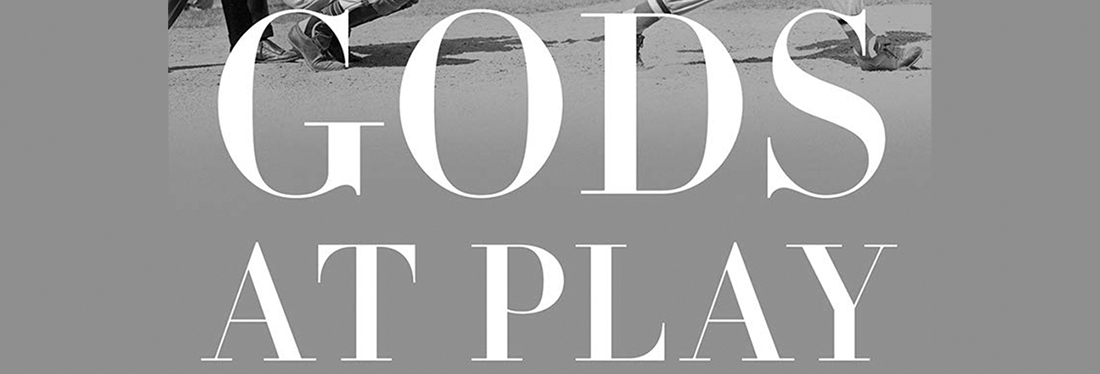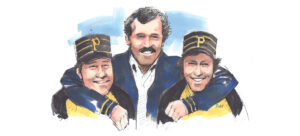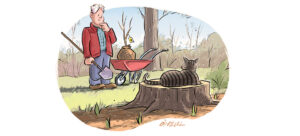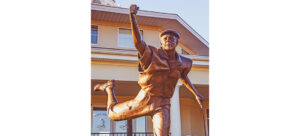
Immortal Stories
By Jim Moriarty
Toward the end of his new book, Gods at Play, Tom Callahan writes, “By now you must know, I’m the hero of all my stories.” It was one of his throw-away dinner lines I heard often enough in the evening at British Opens and Masters and places like that. It was partially — but only partially — true, like Bill Murray in Groundhog Day saying, “I’m a god. I’m not the god . . . I don’t think.”
In one of those publishing house blurbs, some marketing type once decided it was a good idea to describe Callahan’s writing somewhere between the goalposts of “lighthearted” and “airy,” which works if the guy would describe the arrow from a crossbow the same way. If Callahan ever knew the person who wrote it he would have said, “sweet writer,” like patting a 4-year-old on the head.
Callahan went to a Catholic university, Mount St. Mary’s, and the U.S. Marines. That he was a Marine was perfect for him because he always liked to play against type. He was a sports columnist at the Cincinnati Enquirer and, later, the Washington Post before becoming the sports guy for Time and then U.S. News and World Report. I got to know him when he started writing poetry for Golf Digest.
There are a couple of his stories I couldn’t find in Gods at Play, like the time he kidnapped Nancy Lopez, who was coming into Cincinnati for the LPGA Championship in the midst of her rookie hot streak. Callahan wanted an interview. Hell, the whole world wanted an interview. He was told it was impossible. So, Tom guessed what plane she’d arrive on and met her at baggage claim. She assumed the tournament had sent a driver to pick her up. Tom looks more like a chauffeur than Jeeves looks like a butler, so Nancy didn’t think much of it, and Tom didn’t do anything to convince her otherwise. He grabbed her luggage and loaded everything, plus Nancy Lopez, into his beat-up, messy old sportswriter’s car, the anti-limo. He got his interview. She still laughs about it and never has figured out why she got in the damn car to begin with. He was probably telling her a story and she wanted to hear the end.
And he only told half the truth about the time he played with Jack Nicklaus in the pro-am at Kings Island, the Nicklaus-designed course under power lines where they played the LPGA Championship for longer than any real golf tour should have. Tom’s a big guy and, when he caught a drive, it would go. On the first tee, the local boy rose to the occasion. He killed it.
“Chase that, Jack,” he said to Nicklaus, loud enough for the gallery to hear. Nicklaus outdrove him, but just barely. A yard, maybe two. Out in the fairway Callahan’s next shot was a cold, sideways shank. “I won’t be chasing that one, Tom,” said Nicklaus.
Callahan collected writers the way the Medicis collected Leonardos and Michaelangelos. He became Red Smith’s legs when the great Pulitzer Prize-winner got too old to scramble after a quote or two and, later, at British Opens he reprised his role as taxi driver for World Golf Hall of Famer Dan Jenkins, who always believed driving on the left — if it had to be done at all — should be done sparingly, and by someone else. Jenkins called Callahan Simon because he’d once had a driver by that name.
If Callahan was in L.A. he found Jim Murray. If he was at a horse race he was standing on Bill Nack’s withers. When I learned he wasn’t going to Fort Worth for Jenkins’ funeral a couple of years ago, he told me he was tired of going to them. But that was against type, too. It was more a case of “Elvis is Dead and I Don’t Feel So Good Myself.” It didn’t matter, though, because he’d already supplied the harp music in Golf Digest, writing the best sendoff any sports guy ever got.
Of course, Tom didn’t get everything right. He thought O.J. was innocent until he saw the Bruno Maglis.
I can’t give you the highlights from Gods at Play. The book is 265 pages long, and if you skip any of them you’ll be poorer for it. But here’s just one story. Callahan knew Oscar Robertson from his days playing for the Royals in Cincinnati. Oscar was a tough guy. And, later, after Robertson helped Kareem Abdul Jabbar win an NBA title in Milwaukee, Callahan and Kareem, by then a Laker, had a conversation about him:
“The first time we ever spoke,” I said, “you told me you didn’t really know Oscar. But you came to know him, right?”
“And to love him,” he said. “And to love playing with him. And, probably a little too much, to love watching him play.”
“He was a bit cold-blooded for me,” I said.
“No, he had the capacity for joy that all great players have. He wouldn’t show it to you, though. Or you wouldn’t understand where to look for it. It’s not in the box score, you know.”
But it’s spilled all over the pages of Gods at Play. PS





